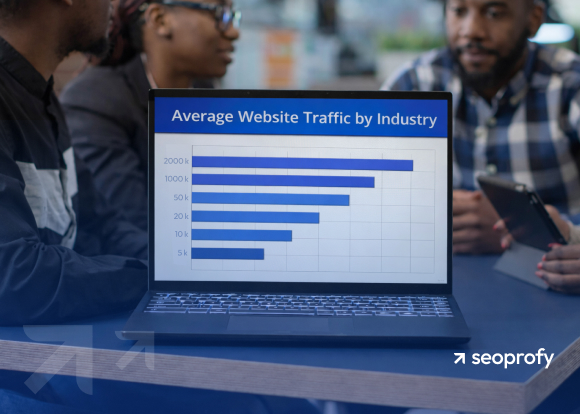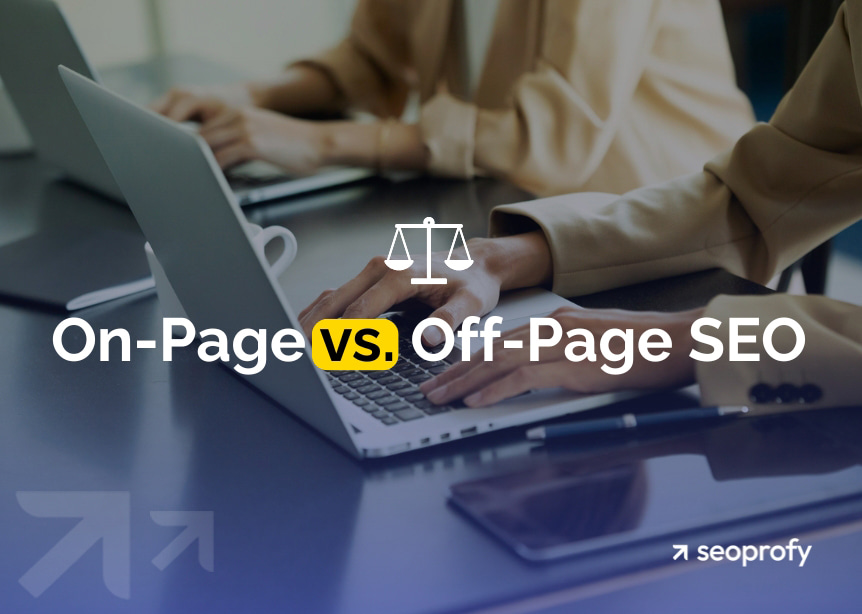Organic search brings in around 66% of call conversions in the legal industry, which shows how much a firm’s visibility on Google affects new client flow. A well-built backlink profile plays a big part in that. Those links tell search engines your website carries authority and help your pages rank for the legal queries that lead directly to calls and consultations.
But where do you get these links? We’ll give you an answer to this question in today’s guide. You’ll learn thirteen proven ways to secure high-quality mentions from relevant sites. We’ll also show you how to tell a good link from a bad one so that your legal practice can maximize the benefits of link building and see it reflected in better organic rankings and more case leads.
- Google treats backlinks as a sign of trust, and law firm pages with more quality links often rank higher in both traditional results and AI overviews.
- Trusted directories like Justia, Avvo, and FindLaw are great sources for legal backlinks.
- Mentions from local newspapers or community sites reinforce geographic relevance and boost local rankings.
- A healthy mix of dofollow and nofollow links from varied sources builds a strong backlink profile.
- Content such as legal guides, case studies, or original research attracts backlinks naturally.
What Is Link Building for Lawyers?
Link building for lawyers is the process of getting your firm mentioned on trusted, topic-relevant websites. These mentions are still one of the main ranking signals and help Google view your site as reliable and credible.
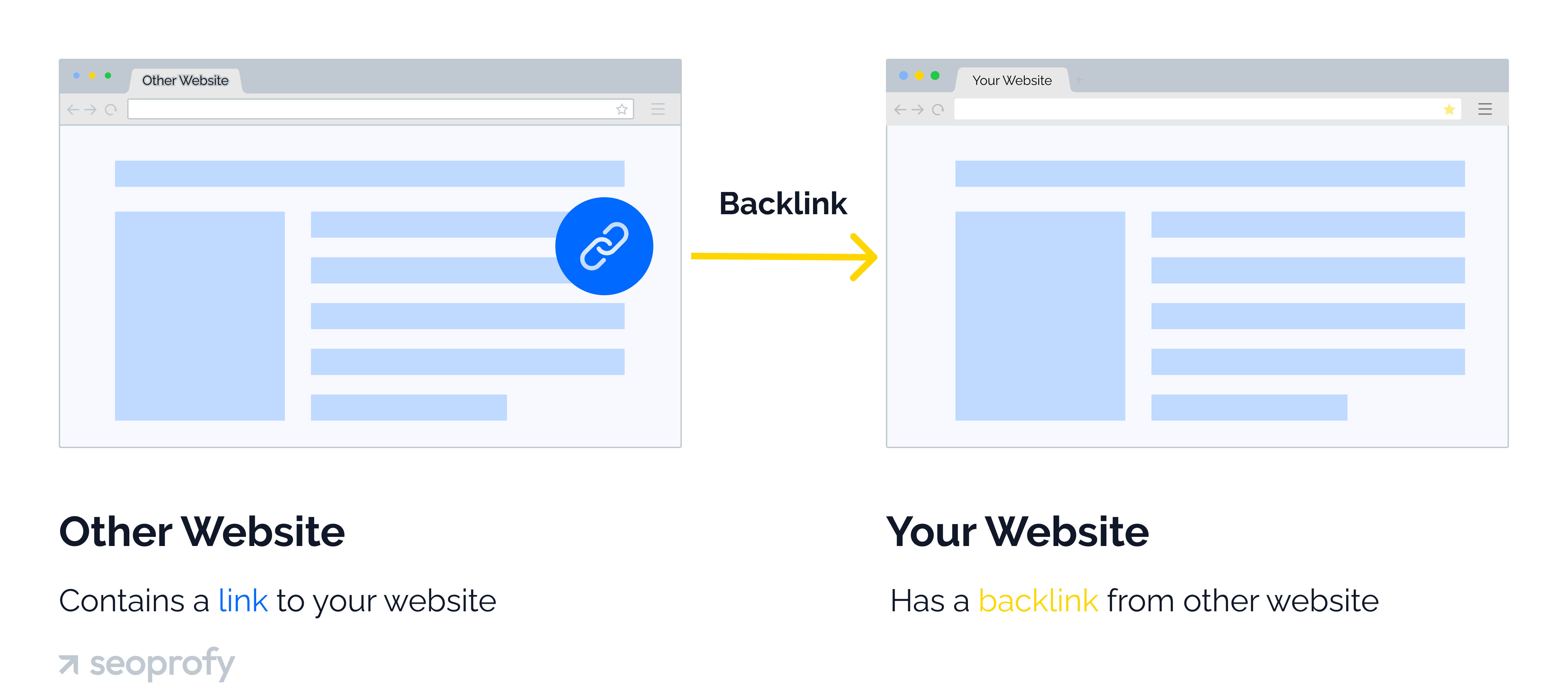
That said, link building in the legal space differs from what you’d see in other industries. Here’s how:
- Quality over volume: Legal sites benefit from backlinks that come from credible sources like universities, bar associations, or established publications, rather than blogs.
- Topical relevance: Google values links that come from pages covering related legal themes, as it signals genuine expertise.
- Local connection: Links from regional media or relevant local organizations send relevance signals to Google and help your firm appear in searches from nearby clients who are seeking legal help.
- Reputation and trust: Because the legal field falls under YMYL, links also reinforce your firm’s authority and show Google that your advice can be trusted.
Together, these elements make link building campaigns more specialized and far more impactful in the legal niche.
The Key Benefits of Link Building for Lawyers
Law firms that earn backlinks from reputable legal websites usually rank higher in organic and local search results as well as Google Maps. That extra visibility puts your firm in front of the prospects and gives you an advantage when it comes to getting more inquiries and consultations. But that’s not all. Below, we’ll list some of the biggest benefits of backlinks for law firms.
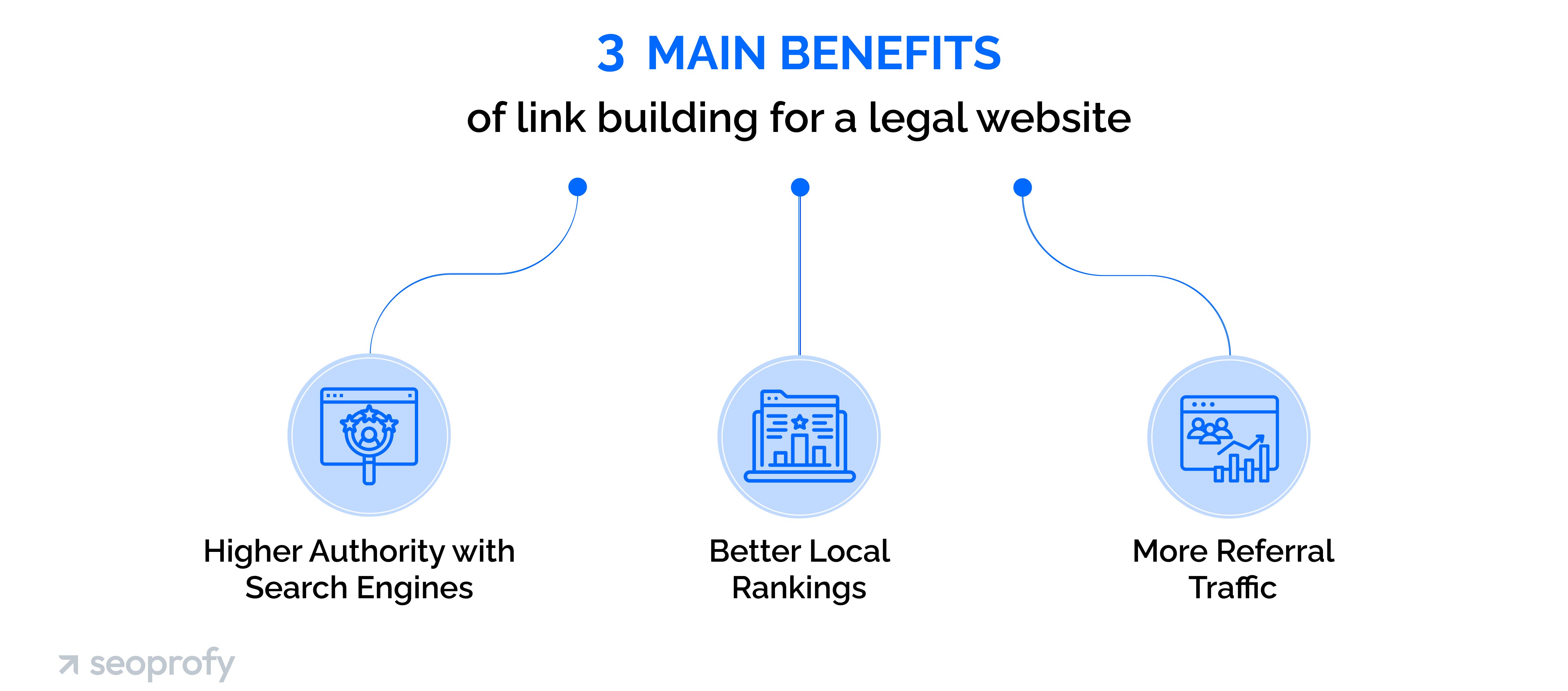
Higher Authority with Search Engines
Google looks at backlinks to judge the quality of your content and your site’s trustworthiness. This extends into the AI Overviews, too, since they lean on sources with a proven footprint across reputable sites. The more relevant mentions you get, the more it signals to search engines that your content is reliable.
If we take a look at the screenshot below, we can see the top-ranking pages for “car accident lawyers in Chicago.” Notice how the websites in the prominent positions all have well-established backlink profiles.
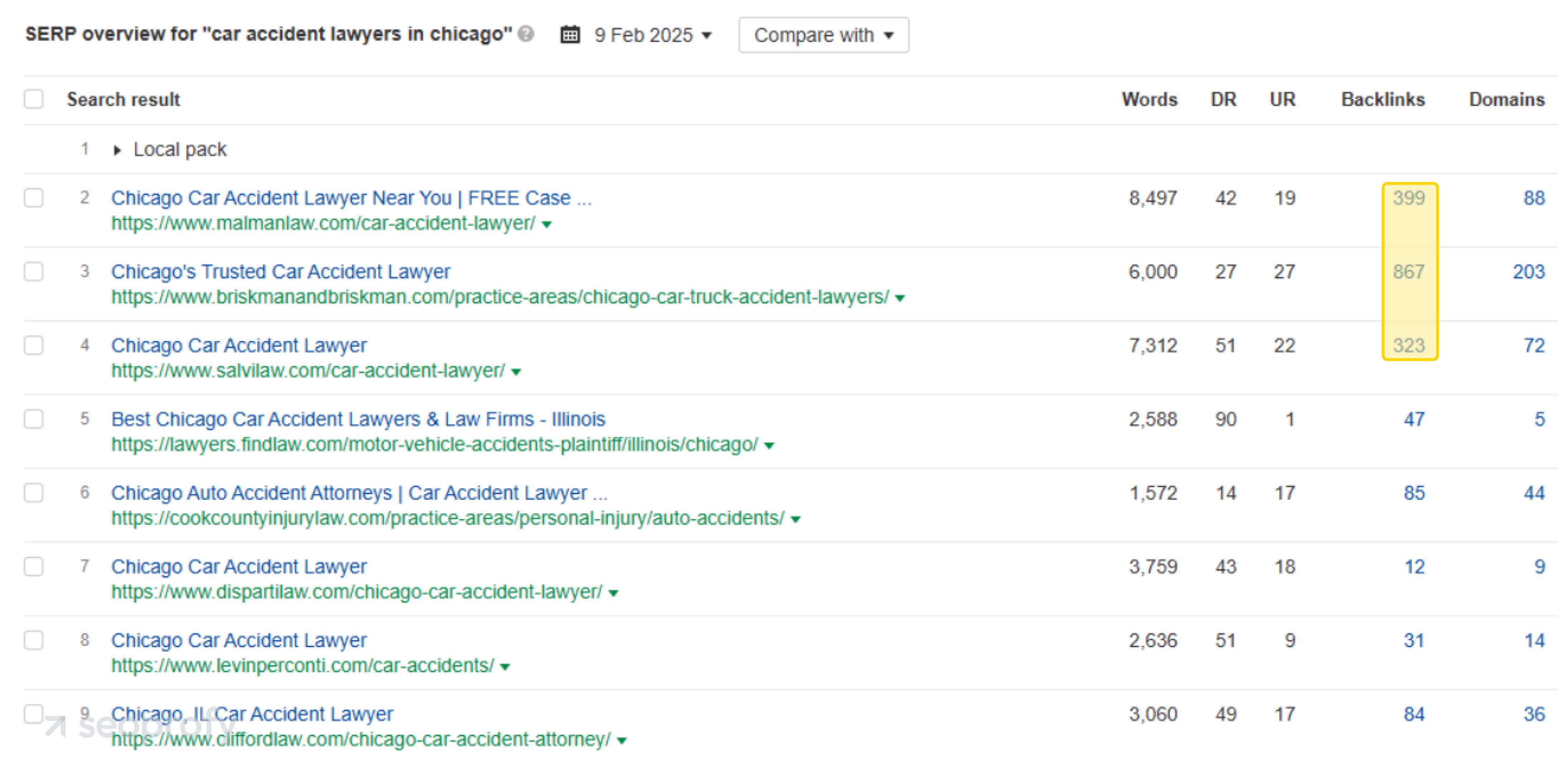
Law firms that want to compete for the same keywords but don’t invest in a good link building strategy will find it difficult to reach the top search rankings. So, website owners should work on their backlink profiles and try to get mentions from high-quality sites to have a better chance of ranking above competitors.
Better Local Rankings
When someone searches for an attorney, Google shows them results based on where they are located. One of the ways lawyers can improve their rankings in those results is by getting backlinks from established sources in their area, which is normally a part of a broader local SEO strategy. These links show search engines that a firm is connected to a specific location.
For example, if a law office in Denver is mentioned in a local newspaper or listed in a bar association directory, it reinforces its presence in that city. The more signals pointing to a firm’s location, the easier it is for search engines to recognize it as a top choice for people searching nearby.
That means businesses with local links are more likely to appear in Google’s Local 3-Pack and also get more calls, website visits, and booked consultations.
More Referral Traffic
People don’t just rely on Google when looking for legal help. They also browse third-party websites and directories to compare their options. So, when they see your law firm referenced as a trusted source, they’re far more likely to click through and get in touch.
How to Identify High-Quality Backlinks for Your Law Firm Website
We hear the term “high-quality backlink” a lot, but what exactly does it mean? Essentially, it’s how much “link juice” or power this hyperlink can pass to your page.
In link building for law firms, the value you get depends on how relevant the linking page is to your topic, its authority, and the overall credibility of the website. Let’s break down these factors, and a few more, in detail below.
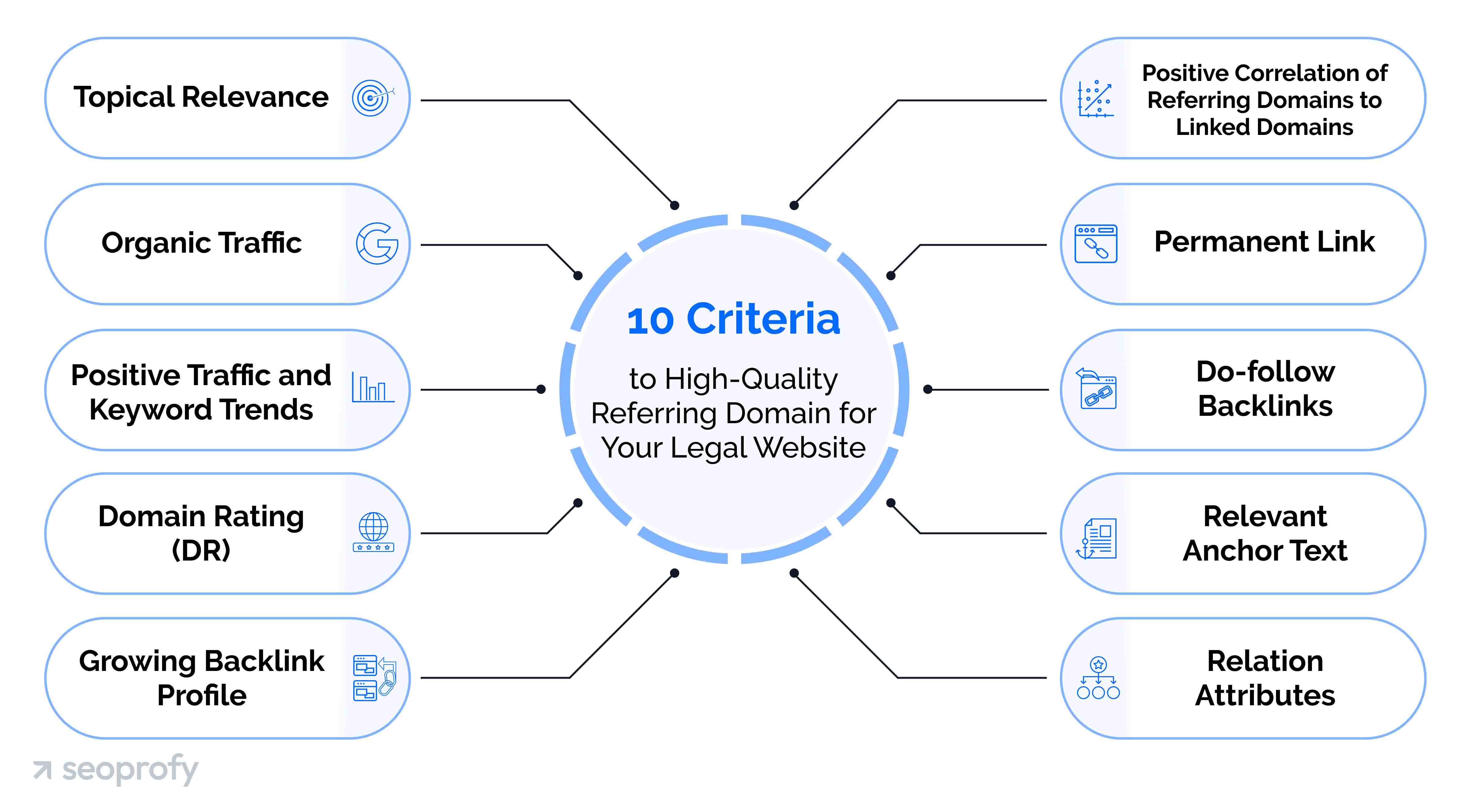
1. Topical Relevance
Backlinks should come from authoritative sites that make sense for your industry. Here’s what Google’s John Mueller has said about it:
“We try to understand what is relevant for a website, how much we should weigh these individual links, and their total number doesn’t matter at all. Because you could go off and create millions of connections across millions of websites if you wanted to, and we could just ignore them all.”
John Mueller
So, in your link building efforts, aim for websites with which you share a target audience and also the ones that are in line with the services you offer. These could be bar associations, legal directories, or law-related sites. Even if you only get a single mention from such sources, it’ll be worth far more than a dozen random links that don’t fit.
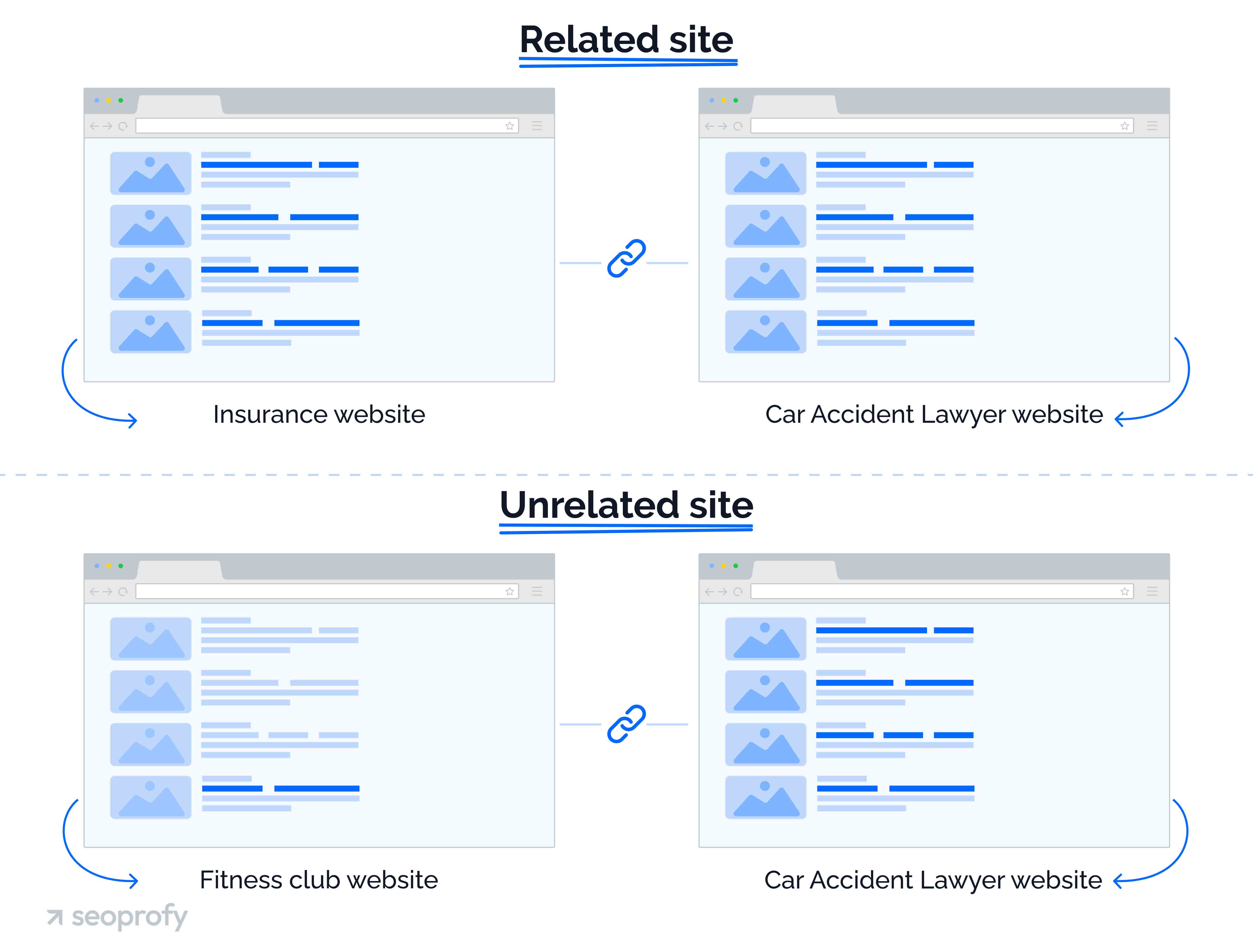
2. Organic Traffic
You need to plan link placement on websites that get a consistent flow of visitors from search engines. If a site ranks well in Google, it’s a good indicator that the domain is trusted and credible. Backlinks from such websites carry more weight.
Additionally, it helps you assess the potential for referral traffic from these websites and see the overall impact they could make on the visibility of your law firm website.
For your law firm’s link building strategy, look for websites with steady or growing visitor numbers. You can find out how much organic traffic the website is getting with the help of SEO tools like Ahrefs, SE Ranking, or Semrush.
3. Positive Traffic and Keyword Trends
The site’s traffic and keyword positions where you plan to place links should be growing or stable. If a website is losing rankings, it may indicate penalties or poor quality. A backlink from a declining website can signal to Google that your site is connected to low-quality content, and you wouldn’t want that.
The best approach you can take in your link building strategies for a law firm is to look for websites with consistent or increasing rankings for relevant keywords. Again, SEO tools like Ahrefs, Semrush, or SE Ranking can help you analyze it.
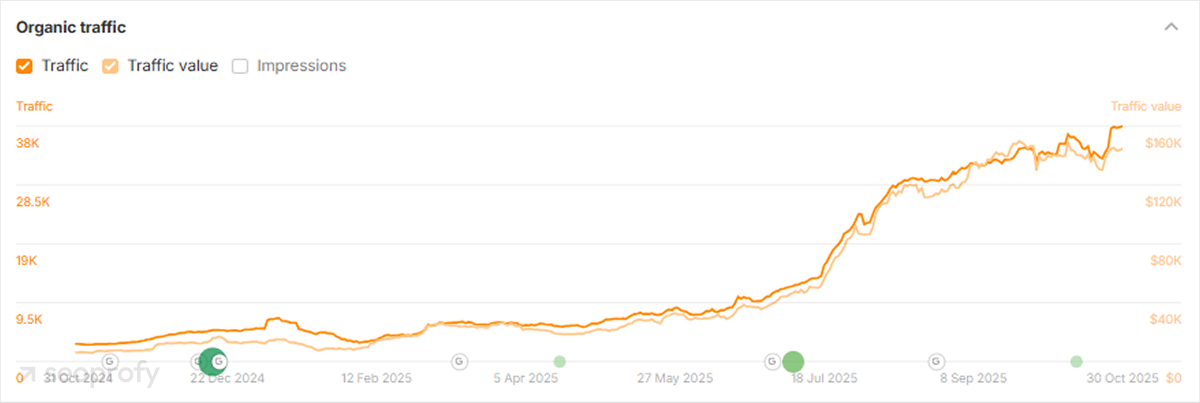
4. Domain Rating (DR)
Domain Rating (DR) is a metric developed by Ahrefs that measures the strength of a website’s backlink profile on a scale from 0 to 100. A higher score generally means the site has more relevant backlinks.
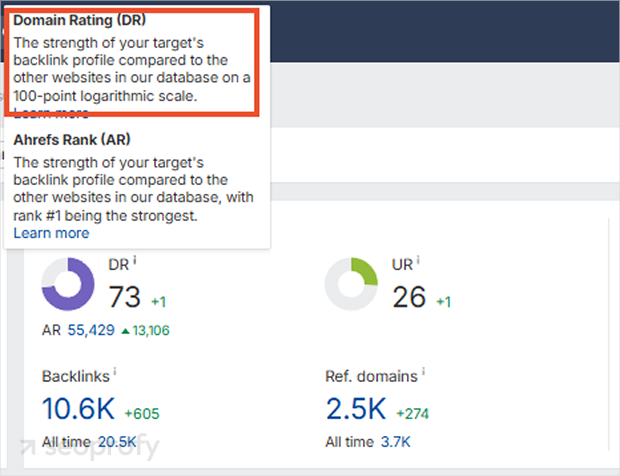
Backlinko found that a site’s link authority, or in other words, DR, strongly correlates with higher search engine rankings, which makes it a useful lens when you look at potential publishers.
At the same time, treat DR as an indicative signal, not an end goal. Google follows its own systems, so try to prioritize topical relevance and steady organic visibility first, then use DR as a supporting reference.
5. Growing Backlink Profile
If your law firm’s website keeps getting new links, it means people still find it useful and important. This helps search engines see your site as a credible source of legal information, which can improve your reputation and visibility online over time.
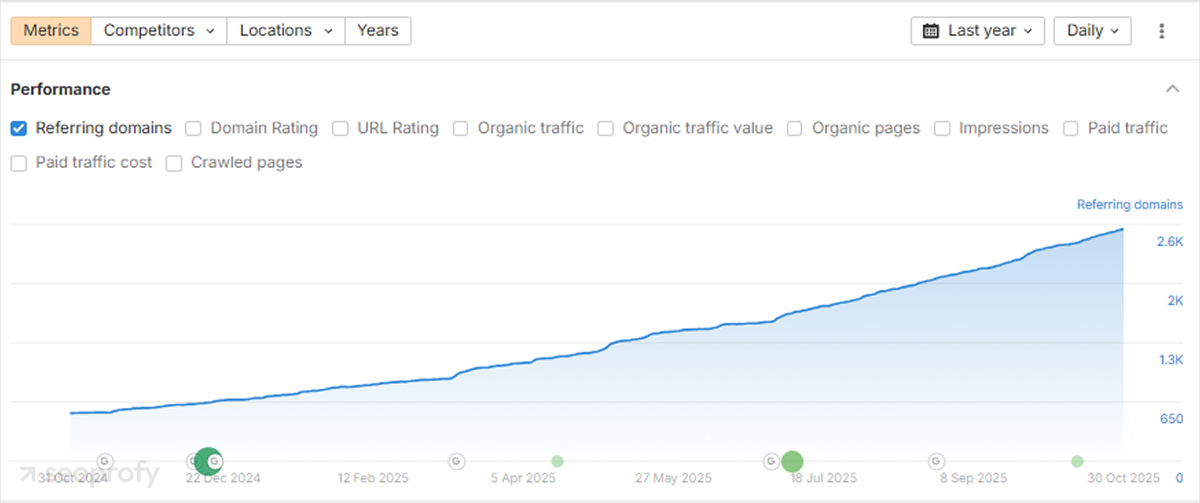
6. Outbound Link Quality and Linking Patterns
When choosing websites for backlinks, pay attention to their outbound linking behavior — trustworthy sites link sparingly and only to relevant, reputable sources. If a domain links out excessively to unrelated pages, it may be part of a link-selling network, which can harm your rankings.
Aim for backlinks from publishers with clear editorial oversight and balanced link profiles, where the number of sites linking to them far exceeds the number they link out to — a clear signal of genuine authority.
7. Permanent Link
Some websites remove links eventually, so they become obsolete for long-term success. If a link won’t last, it’s not worth having in the first place.
Backlinks for lawyers placed in editorial content, guest posts, and legal directories will be live for a longer time. But it’s always a good idea to look at whether or not a site regularly deletes old links before you invest time trying to earn one there.
8. Dofollow Backlinks
Prioritize dofollow links, but keep a natural mix. Since 2019, Google has treated the nofollow attribute as a “hint,” so even these links can help with discovery and indexing.
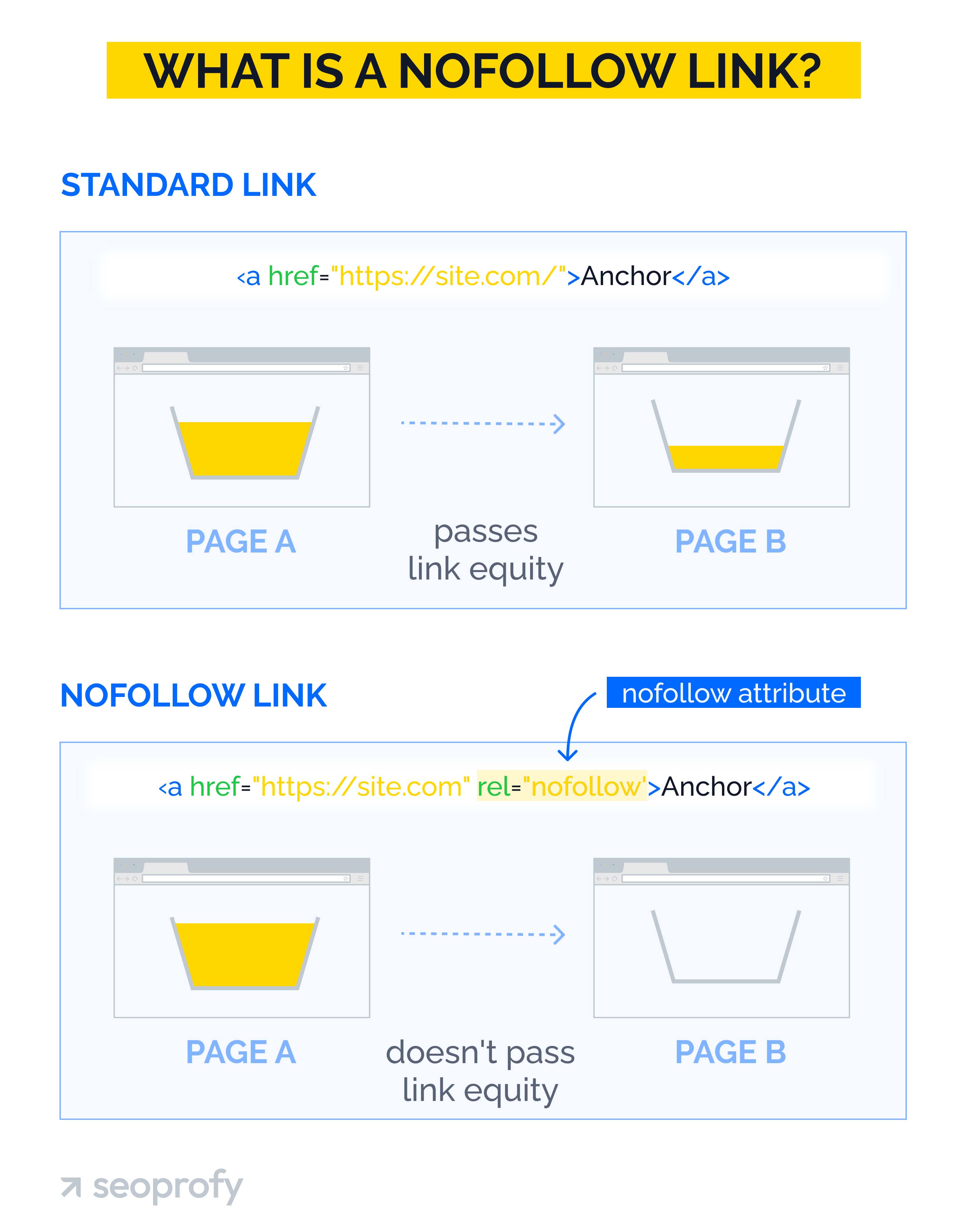
Even though a do-follow backlink has the most impact on rankings, a no-follow counterpart still serves a purpose. If a site only has do-follow links, it can look suspicious, as if the connections were built with the help of manipulative tactics. So it’s better to mix both do-follow and no-follow hyperlinks in your law firm link building strategy to make your site’s backlink profile look more genuine.
9. Relevant Anchor Text
The anchor text is the clickable part of a link. According to Google’s documentation, it needs to be descriptive, fairly concise, and relevant to the page that it links to. Readers should also be able to understand where exactly the hyperlink will take them.
10. Relation Attributes
Rel, or relation, attributes are used in HTML to show Google the relationship between the web page a link is on and the page it links to. Any legal website must add these attributes so that they don’t violate Google’s spam policies. We’ve mentioned a no-follow tag in the earlier section, so now let’s review two other important ones that were introduced in 2019:
- UGC links: These usually appear in blog comments, forums, and discussion boards.
- Sponsored links: As the name suggests, these are used for paid placements.
It’s important to understand that these connections do not pass ranking value the way editorial backlinks do. Still, they can be helpful for brand awareness and lead generation for lawyers.
Partner with SeoProfy to increase your search rankings and attract more organic traffic to your legal practice. Our lawyer SEO experts will come up with a custom strategy to help:
- Improve your firm’s credibility
- Increase domain authority
- Outrank local competitors

13 Strategies for Building High-Authority Backlinks
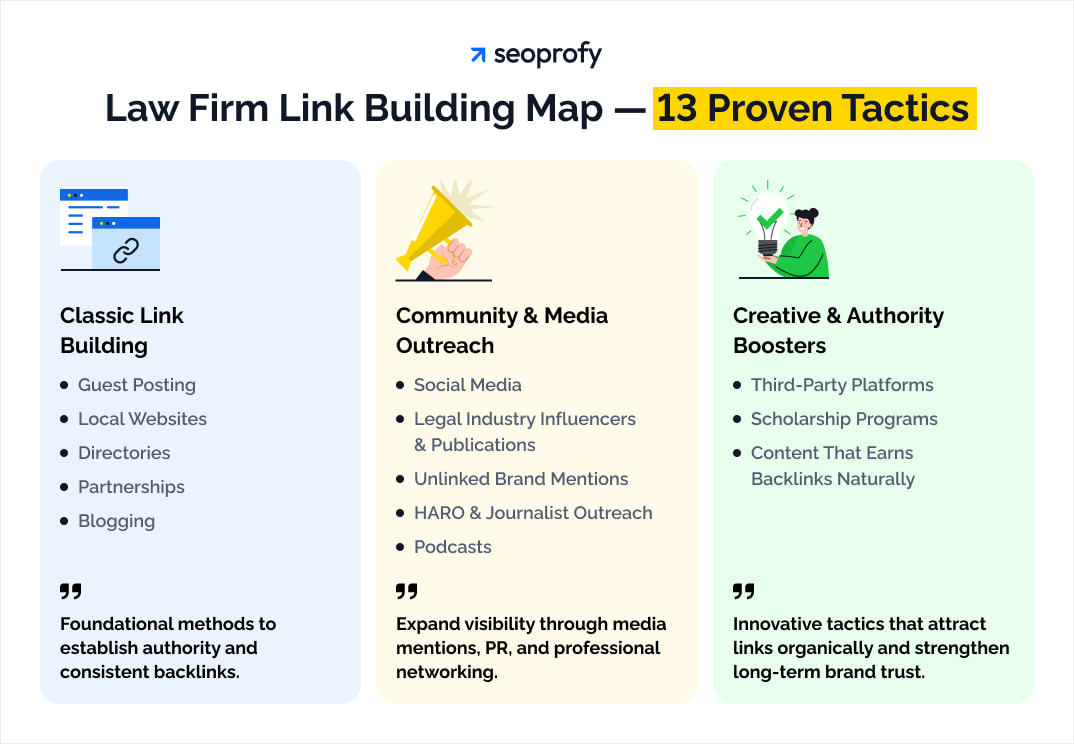
Here’s an overview of the 13 best ways to get high-quality links that will help your site rank higher on search engine results pages. Some are classic methods that law firms have used for years, whereas others are more creative and often overlooked.
- Guest Posting
- Local Websites
- Directories
- Partnerships
- Social Media
- Legal Industry Influencers and Publications
- Unlinked Brand Mentions
- Third-Party Platforms
- HARO and Journalist Outreach
- Scholarship Programs
- Podcasts
- Content That Earns Backlinks Naturally
- Blogging
1. Guest Posting
Guest posting is at the top of our list as one of the most effective link building strategies for law firms. It is also simple to implement. You write a piece of content for another website and get a backlink from them in return. This strategy positions you as an expert in the legal field and gets you more exposure.
In general, your posts need to offer quality information that would be valuable to the audience of the website you’re writing for. For example, you could share:
- Legal tips and expert advice
- Breakdowns of new laws or policy updates
- Helpful guides that simplify legal processes
When looking for guest posting opportunities, it’s best to choose websites that have a similar target audience, such as niche legal blogs. You could also check how engaged their readers are. An active audience that shares or comments on posts is usually a good sign.

This method helps your legal practice in several ways. Google begins to view your firm as a trusted source, and appearing on websites where potential clients already spend time can open new referral paths that often lead to direct case inquiries.
2. Local Websites
The next tactic you can try in your law firm SEO strategy is to secure high-quality links from local news sites and regional bar associations. There are plenty of ways to earn these links. Law practices can collaborate with:
- Local news publishers
- Sponsor events within their area
- Join business associations
Even something as simple as speaking at a local seminar or contributing to a local cause can lead to a backlink. Those mentions help people in your area come across your firm more naturally. When your name shows up on trusted community or news sites, it feels familiar to them, and that familiarity often turns into calls or referrals.
3. Directories
Legal directories have been around for years, and they continue to be one of the easiest link building strategies for lawyers. Many of these sites already rank well in search results, which makes them a good place to list your law firm. On top of that, free directories show potential clients that your firm is trustworthy.
Before submitting your practice to a directory, it’s important to check a few things. The site should have high-quality listings and good search visibility. The ones that match these criteria are Justia, Avvo, FindLaw, and Nolo.
When it comes to Avvo, the recent survey that was conducted by the ABA showed that 33% of legal firms out of those surveyed had listings there. Clearly, this directory has a good reputation and is constantly getting a flow of people who are looking for legal services.
As for the benefits, listings in trusted legal directories keep your firm visible to people comparing lawyers in their area. They also send Google signals that your practice is legitimate and active in the legal community.
4. Partnerships
Plenty of businesses and professionals collaborate with lawyers and refer clients to them. You just need to find out the ones that are the most relevant to your specific services and get a partnership with them. This could be a mention on a real estate agency, medical practice, financial advisory, or even other law firms you have connections with.
There are a few ways to secure these links. You could be featured in a partner’s resources section or work with them on a webinar or event. If you’re a personal injury lawyer, you could contribute an article to a chiropractor’s website about the legal steps to take after an accident.
Partnerships like this create steady referral opportunities and position your firm as a reliable contact for professionals who often work with the same clients you serve.
5. Social Media
Although social media links don’t help with search engine rankings, they can still be beneficial. If you promote your blog posts on LinkedIn, X, or Facebook, they could reach more people and get in front of journalists or business owners who might link to them.
It’s also a great way to start conversations and connect with others in your field. You could comment on relevant posts, engage with potential clients, and build relationships that, over time, could lead to backlink opportunities.
In addition to that, social media posting appears to be very effective at generating more leads. Our legal marketing statistics show that 71% of lawyers were able to gain new clients through social platforms.
6. Legal Industry Influencers and Publications
People who look for legal services on Google often read up on content from influencers or turn to publications for information. That makes these places a natural choice when it comes to link building for attorneys. In contrast to guest posting, where you submit articles yourself, this strategy is when other sources cite your expertise.
One way to get mentioned is by engaging with legal influencers on LinkedIn or participating in industry panels. Attorneys who regularly offer valuable perspectives are more likely to be quoted in such places, as they often look for expert opinions to include in their content.
Links from respected legal voices go a long way in building your reputation. They let you increase recognition among peers and attract clients who value your expertise.
7. Unlinked Brand Mentions
Law firms are often mentioned online without a link back to their website. These unlinked brand mentions could be some of the easiest backlinks for you to secure. If a website has already referenced your firm, they’re likely open to adding a link.
The best way to find these mentions is with the help of social monitoring tools like BrandWatch. You could also check past press features and event listings. If you find an unlinked mention, reach out to the site owner or journalist with a short email. Thank them for the mention and also ask if they could add a link.
Turning mentions into links takes little effort but gives you a lot in return. Each added link helps more people reach your site and keeps your brand connected across the web.
8. Third-Party Platforms
You could also utilize third-party blogging platforms, such as Medium, LinkedIn Articles, or Substack, in your law firm link building efforts. These platforms give you full control of what and where to post.
On top of that, you can also link from them back to your site. Although some of these backlinks do not have a direct effect on rankings, they can contribute to more natural links from other sites.
9. HARO and Journalist Outreach
Another common way to support link building for a law firm is outreach. Journalists often look for legal professionals, and law firms that respond to these requests can secure high-authority backlinks. One of the most well-known platforms for this is Help a Reporter Out (HARO).

As for the alternatives, there is Qwoted and Featured, which also connect reporters with expert sources. You can sign up for these platforms, monitor requests related to your practice area, and submit responses. If a journalist uses your response, they’ll normally include a backlink to the firm’s website.
Such references also open doors to new professional connections. Reporters remember who shared practical insights, and that can lead to invitations to comment on future stories or take part in local events.
10. Scholarship Programs
Colleges and universities often list scholarship opportunities, and when they do, they usually include a link to the sponsor’s website. Since .edu domains are highly trusted by search engines, backlinks from these sites can be incredibly valuable for your firm’s link profile.
To make this work, you can create a page for law-related scholarships for students pursuing degrees in pre-law, criminal justice, or related fields. From there, you can reach out to schools and scholarship directories to get it listed.
Scholarship pages tend to attract links from trusted educational sites while also building goodwill in your community. It’s a long-term way to earn relevant links and leave a positive impression of your firm among students and universities.
11. Podcasts
Not many law firms know that podcasts, too, can be a great way to get backlinks. Many podcast hosts publish guest bios and often include a link to the guest’s site. Additionally, appearing on relevant shows can help lawyers reach more people who might be interested in their legal services.
It does take a bit of research to find suitable podcasts. One helpful tool you can try is SparkToro. You can type in a keyword like legal services to see what shows your audience listens to. From there, you can email the host a short introduction and pitch a topic you can speak on.
This method often flies under the radar in link building for lawyers, yet it can be surprisingly effective. Podcasts help you connect with potential clients and referral sources in a more personal way and keep your firm in mind for future legal needs.
12. Content that Earns Backlinks Naturally
Of course, one of the common ways to get backlinks naturally for law firms is to create quality content that people want to reference. Here are some of the best formats you can try in your link building campaign:
- Legal guides: Many legal topics are confusing, and people search online for answers to them. A well-written guide that explains common accident claims, for example, can be linked to blogs, local businesses, and legal resource websites. This content type is also commonly used in marketing strategies for personal injury lawyers.
- Original research and statistics: Writers and reporters often look for numbers to include in their articles to support their statements. A law firm that collects and organizes data like divorce rates by state can become a go-to source.
- Legal templates and ebooks: Law firms handle complex legal matters every day, but most people don’t have access to this knowledge. Publishing an ebook that breaks down legal topics in simple terms can turn your firm into a trusted resource and draw in more website traffic to your practice.
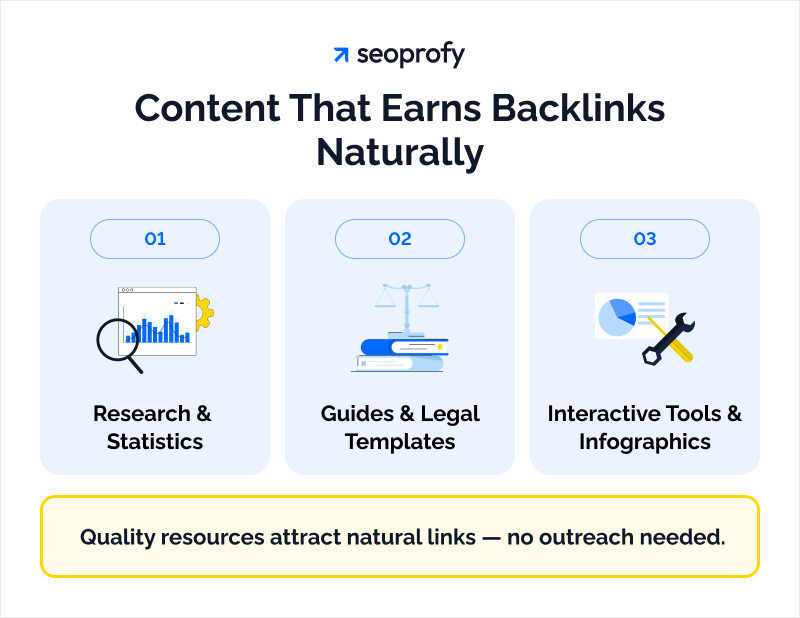
High-quality content like this has a way of staying relevant long after it’s published. In the long run, these pages help more people come across your firm through search or referrals from sites that already have your audience’s trust.
13. Blogging
Last but not least on our list of link building strategies for lawyers is blogging. The research we’ve done for our legal industry marketing statistics has shown that 29% of law firms have gained clients through their blog posts. In addition to the fact that you can engage more clients with this tactic, other websites may link to your pages as a resource.
So, what can you blog about? Start with the legal questions you answer all the time. Legal updates, practical advice, and successes of your previous are also good choices. Overall, the more you focus on blogging for lawyers and write about legal issues people are actively searching for, the better your chances of earning backlinks from other websites.
How to Build a Sustainable Link Building Strategy for Your Law Firm
To design a good link building strategy, you need to think through all the details behind it. Below, we’ll share a few steps on how you can do it.
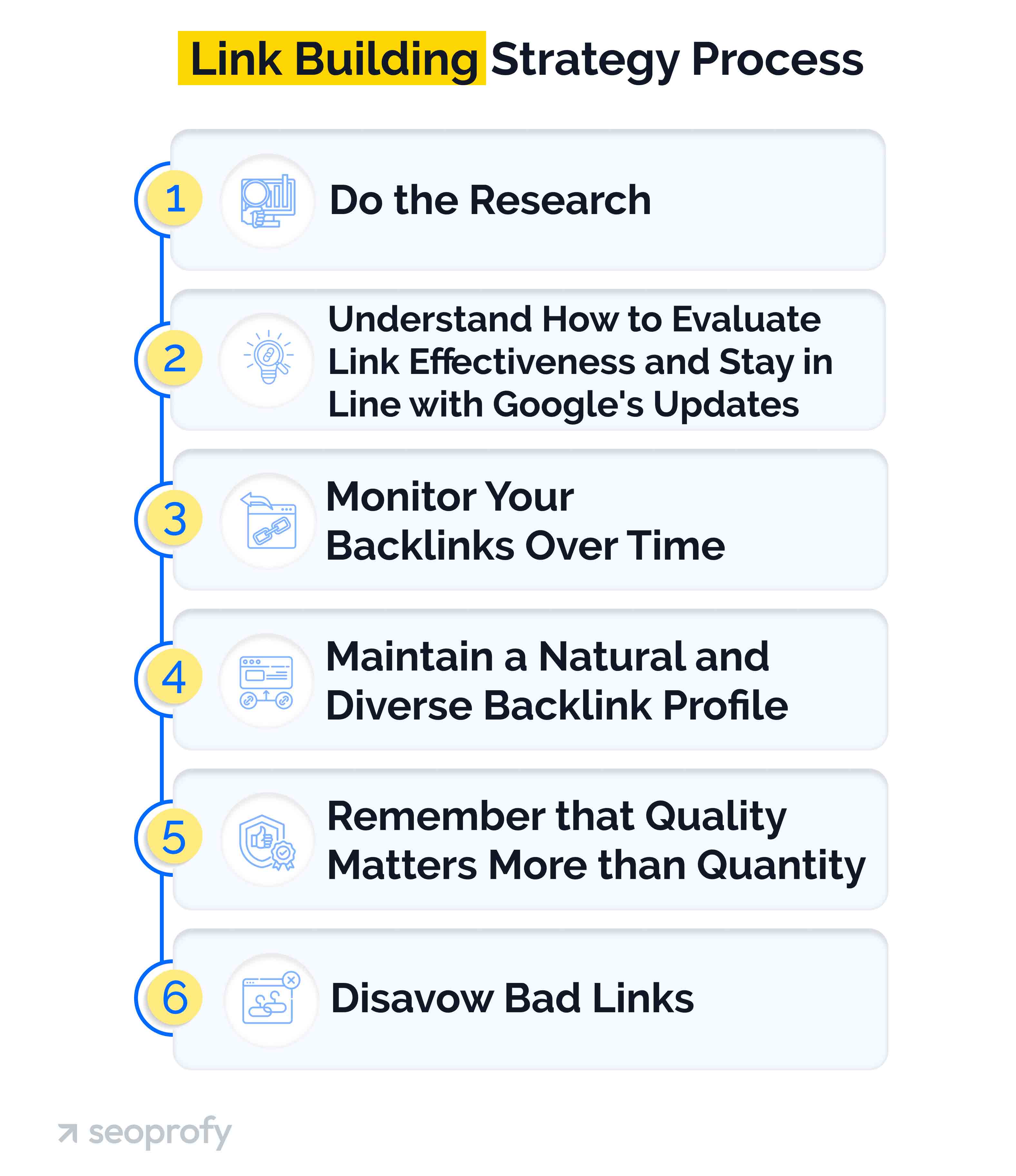
Do the Research
Before you reach out for backlinks, it’s important to first do a law firm SEO audit to check your website’s current performance. You’ll also need to identify which pages should earn links. It could be your homepage or service pages that are of high priority.
Then, you’ll need to find relevant sites that would be good link sources. Legal blogs, news sites, bar associations, and industry directories are good places to start.
Understand How to Evaluate Link Effectiveness and Stay in Line with Google’s Updates
Earlier, we explained what makes a high-quality backlink. We recommend keeping an eye on that section to check if a link is worth pursuing. The most important thing to remember is that you should focus on trusted, authoritative websites that are relevant to your practice area.
Additionally, you need to remember that search algorithms constantly change and new trends appear in legal practice SEO. This means you’ll need to follow industry updates and adjust your law firm link building strategy to keep it effective.
Monitor Your Backlinks Over Time
Backlinks come and go. Some websites remove hyperlinks over time, whereas others might link to you without notice. To check on it regularly, you can use tools like Ahrefs and Google Search Console. They help you see where your links are coming from and if any should be removed.
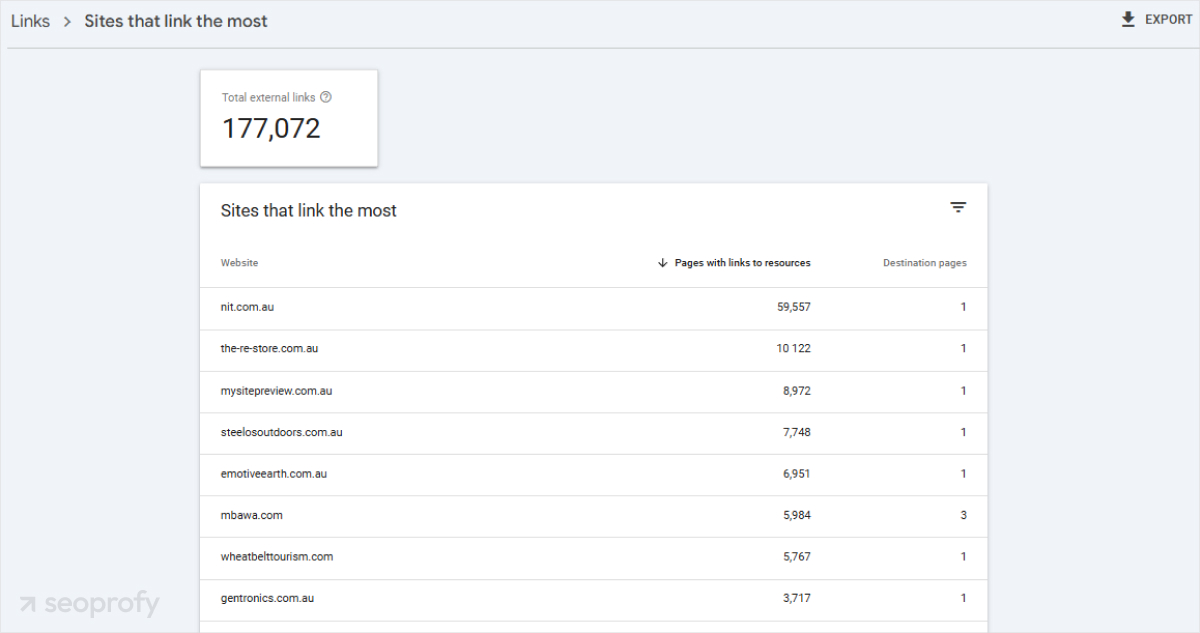
Keep an Eye on Competitors
Other law firms are building backlinks too, and keeping an eye on their strategies can help you find low-hanging fruit. Tools like Ahrefs, Semrush, and Majestic can show you where competitors are getting their links, which websites mention them most often, and how those links might be affecting their rankings. You can then reach out to the same websites and see if they can link to you, too.
Maintain a Natural and Diverse Backlink Profile
A healthy backlink profile has links from different sources, like editorial mentions, legal directories, guest posts, and local citations. If too many links come from the same place or appear overnight, search engines may view it as a manipulative link building strategy rather than genuine growth.
The safest approach is to build links at a steady pace from reputable and relevant websites. A mix of high-quality sources will look more natural and help you avoid penalties. It’s also the method most law firm SEO companies use to keep growth consistent and organic.
Remember that Quality Matters More than Quantity
Link building for attorneys, or any other industry, is always about quality. Search engines value links from authoritative websites, and even one such link can do more for your credibility than hundreds of low-quality ones.
These hyperlinks aren’t always easy to get, but they’re worth the effort. Prioritizing relevant, well-respected sources over quick, easy backlinks will help strengthen your website’s reputation and keep it in good standing with search engines.
Disavow Bad Links
Not all links are good for your site. Links from spam sites, low-quality directories, or unrelated blogs can make your website look untrustworthy. So, you need to check where your links come from.
If a bad link appears, the best option is to have it removed. When that’s not possible, Google’s Disavow Tool lets you ask search engines to ignore it. This helps prevent spammy links from affecting your site’s performance.
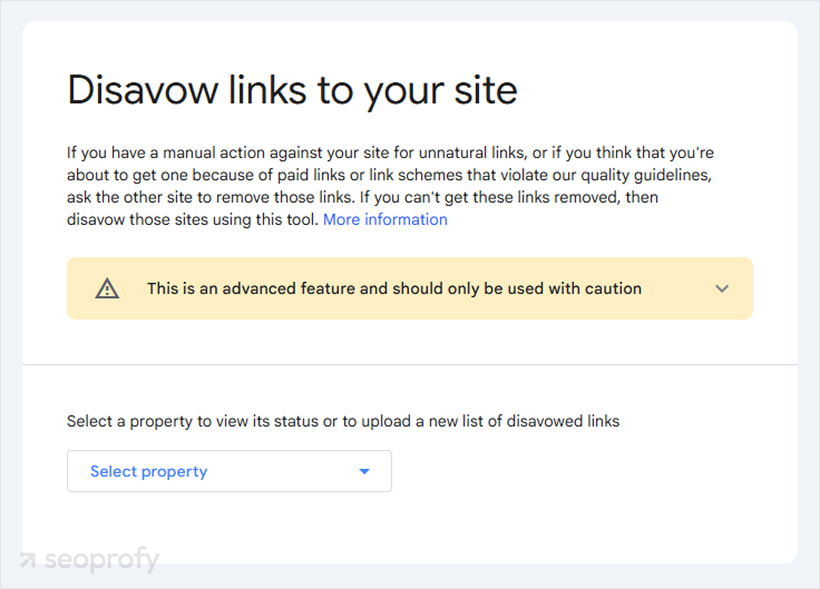
Common Mistakes to Avoid in Law Firm Link Building
Below, we’ll share some of the mistakes law firms make when building backlinks. Try to avoid them in your strategy to stay on good terms with search engines and keep high search engine rankings.
Buying Low-Quality Backlinks
Some companies sell backlinks at cheap prices. Although it might seem like a quick way to improve rankings, it rarely works. Google actively penalizes sites that use unethical strategies, and if your site is flagged, you could lose search rankings.
In addition to the penalties from search engines, paid links also damage your site’s reputation. So, beware of this mistake in your link building efforts.
Use of Black Hat Tactics
By black hat tactics, we mean automated link building, link exchanges, private blog networks (PBNs), and other manipulative strategies. All of these are against search engine policies, just like buying links. If you get caught using them, your rankings can be lowered, and in certain cases, your website can be de-listed from search entirely.
Unnatural Anchor Text Patterns
Anchor text is important, but you should remember to add some variety when writing it. If your anchors contain the same keyword-heavy phrases across multiple backlinks, it can make your link profile look unnatural.
Search engines can notice this, and it can raise some red flags and impact your positions in search results. So, try to vary anchor texts throughout your link building campaign to make them look more organic.
Wrapping Up: Build Authority, Not Just Links
As you can see from our guide, link building for lawyers and attorneys is not a simple task. You need to research websites, create valuable content, and keep building relationships that lead to quality mentions. But those links pay off in the long run and help your firm strengthen domain authority and rank higher for lucrative legal terms.
At our SEO company for law firms, we’ve built more than 45,000 backlinks, including many for the legal clients. Our team knows which websites move the needle for legal SEO and how to get your firm mentioned on pages that your potential clients already read. If that sounds like something you’re looking for, send us a message. We’ll review your site and create a custom plan that fits your practice.











